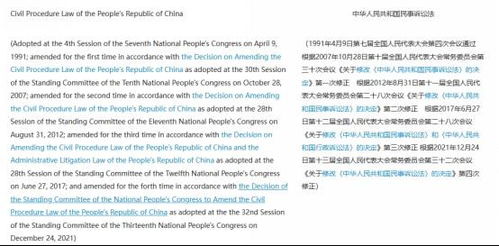Legal Translation: Principles and Best Practices
Legal translation is a specialized field that requires not only linguistic proficiency but also a deep understanding of legal systems and terminology in both the source and target languages. Here are some key principles and best practices to consider when translating legal documents from Chinese to English or vice versa:
1.
Accuracy
: Accuracy is paramount in legal translation. Any mistranslation or ambiguity can have serious consequences. Translators must ensure that the translated text reflects the precise meaning of the original document.2.
Legal Knowledge
: Translators must possess a strong understanding of both the legal systems involved. This includes familiarity with legal terminology, concepts, and principles in both Chinese and English.3.
Cultural Understanding
: Legal concepts and practices may vary significantly between different countries and cultures. Translators must be sensitive to these differences and ensure that the translation is culturally appropriate for the target audience.4.
Consistency
: Consistency is key to producing a highquality legal translation. Translators should use consistent terminology and style throughout the document to avoid confusion.5.
Clarity and Readability
: Legal documents can be complex and dense, but translations should be clear and easily understandable to the intended audience. Translators should strive for clarity while preserving the legal accuracy of the text.6.
Confidentiality
: Legal documents often contain sensitive information, so translators must maintain strict confidentiality and adhere to professional ethics.7.
Research Skills
: Translating legal documents may require research into specific legal terms, concepts, or cultural nuances. Translators should be proficient in conducting legal research to ensure the accuracy of their translations.
8.
Certification and Authentication
: In some cases, legal translations may need to be certified or authenticated by a qualified translator or a relevant authority. Translators should be familiar with the certification requirements in their jurisdiction.9.
Attention to Detail
: Legal documents often contain precise language and formatting requirements. Translators should pay close attention to detail to ensure that the translated document adheres to these requirements.10.
Revision and Proofreading
: Before finalizing a legal translation, translators should thoroughly revise and proofread the document to correct any errors or inconsistencies.In addition to these principles, it's also essential for legal translators to stay updated on changes in both legal systems and languages. Continuing education and professional development are crucial for maintaining proficiency in this specialized field.
By following these principles and best practices, legal translators can produce accurate, reliable, and culturally appropriate translations that meet the needs of their clients and ensure compliance with legal requirements.












评论